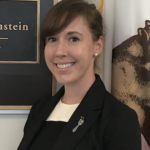As an internal medicine resident, I was fortunate to be able to accompany a leader from my residency program to the American College of Physicians advocacy day in Washington, D.C.—likely because I was on an elective rotation and wouldn’t require coverage. Because of this good fortune, I was able to see firsthand how much our elected officials can learn from interaction with physicians and vice versa.

Dr. Downey
Our group included physicians from every stage in their careers and representing many specialties. While in Washington, D.C., I was able to attend a meeting with a legislative assistant to a member of the House that was particularly eye-opening. One of the issues on our slate that year—which continues to be a subject of discussion—was a lack of residency training slots. When the conversation came around to how the number of training spots is largely influenced by Medicare, the legislative assistant’s response was, “I have plenty of friends who can’t find a job right after law school, and they aren’t asking the government for a handout.” Frankly, I was shocked that the legislative assistant in charge of healthcare issues wasn’t aware that a medical student graduate can’t just go directly into the workforce without completion of residency training.
I share this anecdote not to disparage this particular assistant but to showcase that each and every one of the physicians reading this is already an expert and doesn’t need any special training to be an advocate. After all, advocacy is merely public support for, or recommendation of, a particular cause or policy. All physicians understand the need to train more doctors and the burden that prior authorization and step therapy places on us, our practices and our patients. We all understand that if Medicare reimbursement fails to keep pace with inflation, our ability to care for Medicare patients will be placed in serious jeopardy.
The beginning of 2023 brought the start of the 118th Congress, where 76 legislators were sworn into office for their very first term. (You can use this link to see if your representative or senator is a first-time legislator: https://www.foley.com/en/insights/publications/2022/12/118th-congress-freshmen-members-house-senate.) The influx of new faces in Washington, D.C., marks a great opportunity to establish a relationship with your new member of Congress and help them understand the ins and outs of what it takes to take care of patients.
Many Ways to Connect
One opportunity to do so is through the ACR’s Advocates for Arthritis fly-in held in September. During this event, everything is taken care of—ACR representatives will arrange meetings for you with your representatives and provide a half-day of training to get you up to speed on how you can be the most effective advocate.
However, you need not travel to D.C. to form a relationship with your representative; local meetings in your own district are just as important. Every member of Congress has one or more local offices where he or she can meet with constituents. These offices have folks whose job it is to help with communication between representatives and all constituents, including you! Elected officials depend on their staff to keep a finger on the pulse of what’s happening in the district and advise them on local issues. Most senators and representatives are in their home districts regularly. During these district work periods, elected officials are hearing about myriad issues affecting your friends and neighbors; it is critical that they also hear from you. Speak up for rheumatology and help educate lawmakers on the important issues facing our community. If you are apprehensive about reaching out on your own, contact ACR advocacy staff at [email protected] to assist with arrangements.
Legislative alerts are another great way to get involved without spending more than a few seconds of your time. The ACR advocacy team stays up to date on anything happening in Congress that could impact rheumatology practices or patients. They then raise the alarm for those potentially affected to communicate with elected officials what you think about the issue at hand. Officials use these letters, faxes, phone calls, emails and even tweets to gauge what their constituents think about specific issues. As few as 10 or 20 pings about a given issue are enough to get an official’s attention. Even if you don’t get a response, rest assured that your representative’s office has taken note of your concerns.
Speaking of tweets, your legislators are on social media. You can tag your representatives to alert them of particularly meaningful news articles on pending legislation or any other topic that could impact the care you provide for your patients. Additionally, following your representatives on social media allows you to keep up to date on happenings in your district.
If you have more time to give, consider volunteering as a subject matter expert for the ACR. When issues come up in your particular area of expertise, ACR staffers will call on you to offer insights and opinions. Perhaps there is an area that you feel especially passionate about—this can provide great material for an opinion article or letter to the editor for your local paper.
Once you have a relationship with your elected official, consider offering to assemble a group of patients, physicians and other healthcare professionals who could advise your representative on healthcare-related issues. Rheumatologists, consider inviting a member of your congressional delegation to your office, hospital or clinic for an onsite visit. By showing them examples of the day-to-day concerns of patient care delivery, you enable them to become especially sensitive to practice issues.
To get started, visit the ACR’s advocacy webpage for the latest news on the College’s advocacy efforts. Need some help? Contact ACR Government Affairs at [email protected] or 404-633-3777 for help with your advocacy activities.
Christina D. Downey, MD, is chair of the ACR’s Government Affairs Committee and an associate professor of rheumatology and division chief at Loma Linda University, Calif. The opinions expressed are her own and she does not speak on behalf of her employer.

